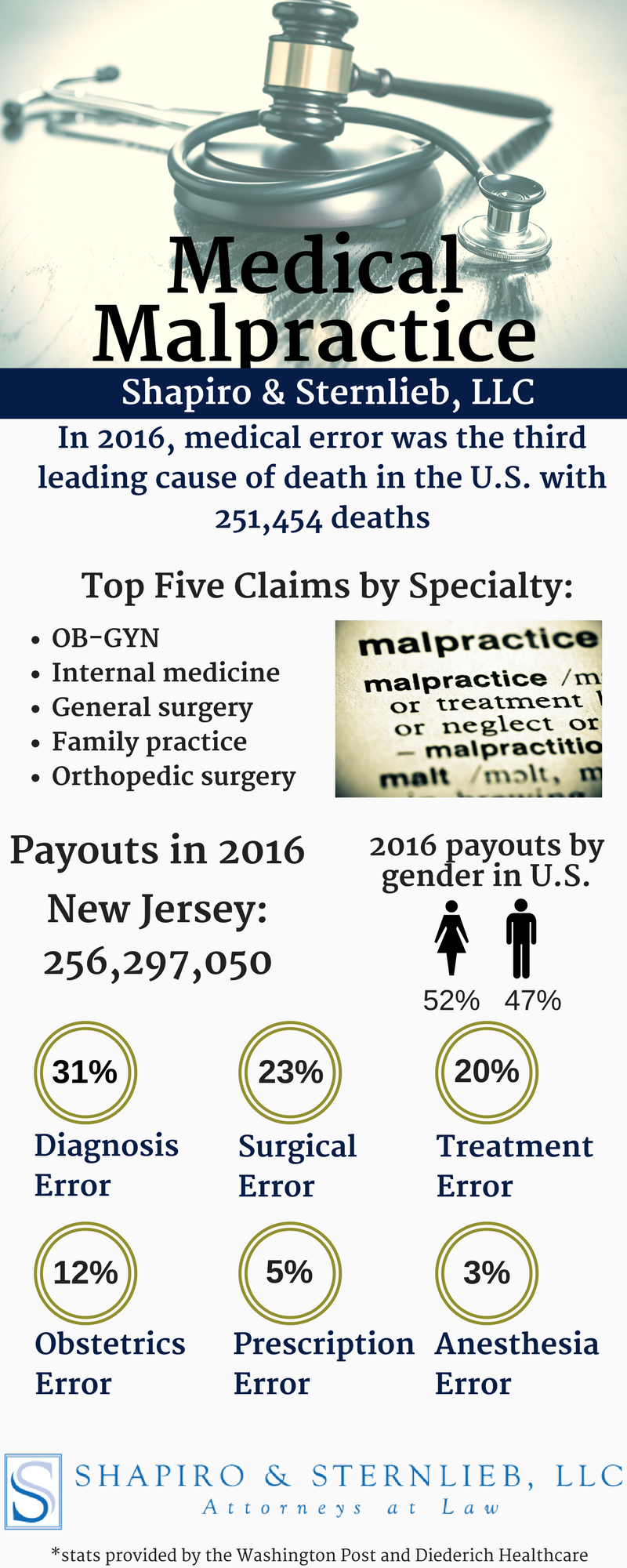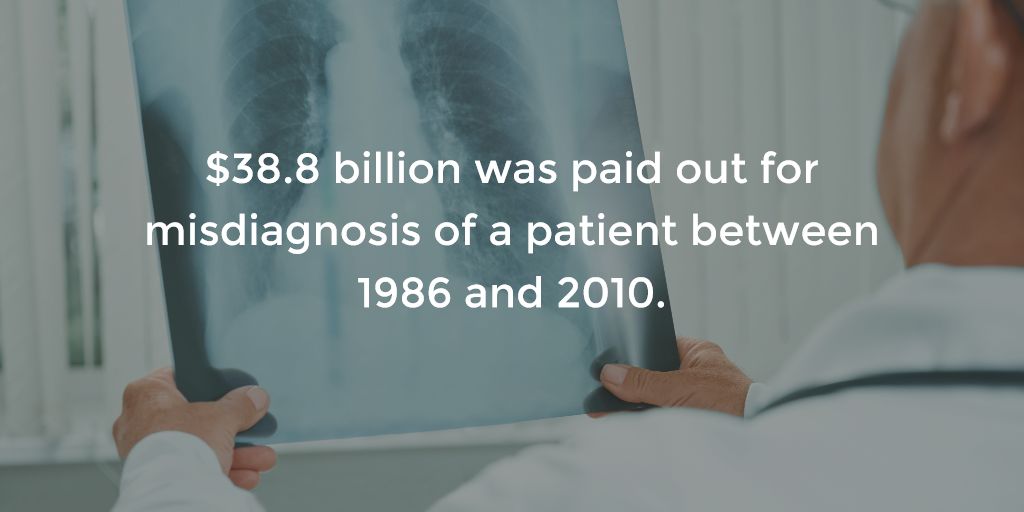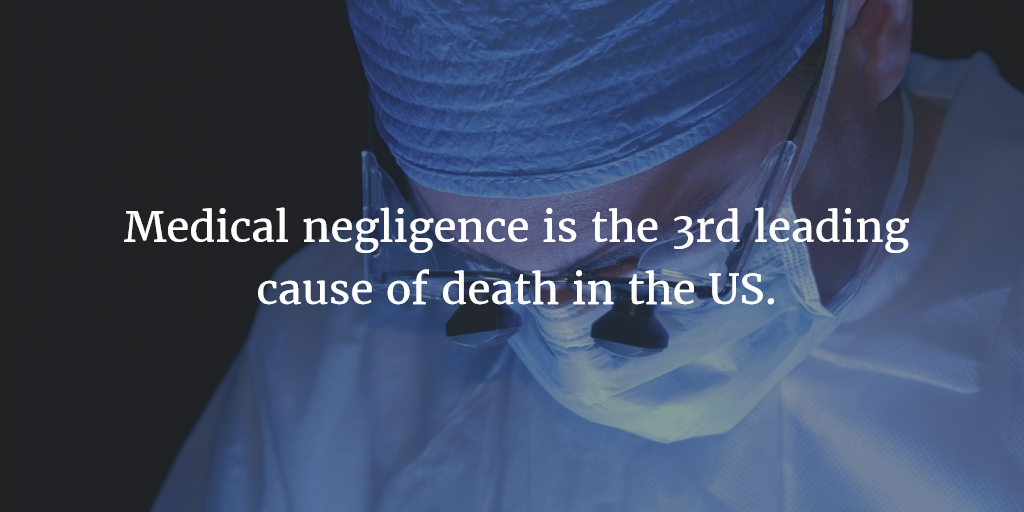Medical professionals face life-and-death situations on a daily basis. As patients, we trust our health care providers to maintain a standard of care. Unfortunately, medical negligence is the third leading cause of death in the United States, according to a recent study by researchers at Johns Hopkins Medicine.
If you or someone you loved has suffered due to subpar medical care, please contact Shapiro & Sternlieb, LLC today online or at (732) 617-8050 to schedule a free, no-obligation consultation with our experienced medical malpractice attorneys. We welcome clients from Newark, Jersey City, Monmouth County, Middlesex County, and nearby areas in New Jersey.
Medical malpractice cases are incredibly complex and require the knowledge and skill of a seasoned lawyer. Some of the most important details to understand about these complicated and often heart-wrenching claims include:
- What Is Medical Malpractice?
- Emergency Room Errors
- Surgical Errors
- Medication Errors
- Anesthesia Errors
- OBGYN Malpractice
- Lung Cancer Screenings
- Medical Malpractice That Results in Death
- Proving Negligence in a Medical Malpractice Claim
- Damages in a Medical Malpractice Claim
What Is Medical Malpractice?
Medical malpractice occurs when a medical professional fails to treat and care for a patient with a reasonable amount of expertise and judgment. Medical errors often result in severe injuries that require further treatment to correct. These injuries can be life-altering, and impact your ability to work, function or enjoy life the way you once did.
If your medical provider was careless, lacked adequate skills or disregarded standardized rules, you may be able to prove negligence. If such negligence resulted in damages, you may be able to pursue compensation.
Hospitals, nursing homes and various other medical institutions can be held liable for the negligence of their employees, including:
- Doctors
- Nurses
- Surgeons
- Specialists
- Administrative staff
- Pharmacists
It’s important to realize that by its nature, medicine is a very complex and not all unsuccessful outcomes are the result of malpractice. Many medical procedures carry inherent risks. Complications can result despite excellent care. You must demonstrate that your injury was caused by a mistake or negligent care in order to have a valid claim of medical malpractice.

Emergency Room Errors
Emergency rooms are some of the most challenging environments for medical professionals to work. In the fast-paced, and often hectic, working conditions, medical professionals need to think quickly and clearly under extreme pressure. In the effort to save lives, miscommunication and errors can lead to even worse problems than the initial emergency.
Emergency room errors can result from a number of potential causes, such as:
- Overcrowding
- Insufficient training
- Fatigue
- Ignoring or failing to obtain a patient’s medical history
- Inadequate resources
Medical professionals who work in emergency rooms face incredible pressure, and the stakes couldn’t be higher. It’s important to understand that this is the nature of ER work, and high demands do not excuse irresponsible or reckless actions.
Surgical Errors
Surgical errors are mistakes made by surgeons or other members of hospital staff that occur during surgical procedures. Miscommunication between branches within large hospitals often plays a significant role in these unfortunate mistakes.
Some examples of common surgical errors include:
- Failure to anticipate complications
- Infections and other complications caused by a lapse in post-operative care
- Poor or incorrect administration of anesthesia
- Instruments and other surgical materials left inside the patient
- Wrong-site surgery
- Incorrect procedure
- Administering the wrong blood type
 Medication Errors
Medication Errors
Mistakes involving medication can occur at any time during your medical process. Hospital staff members may administer the wrong drugs, your doctor may write a flawed prescription, or your pharmacist could make an error while filling your prescription.
Common medication errors include:
- Prescribing the wrong medication
- Prescribing an incorrect time or method of administration of the drug
- Prescribing the wrong dosage for your age or physical condition
- Improperly prescribing medicine for unapproved or “off label” uses
- Failing to consider your medical history and drug allergies
- Administering a drug to the wrong patient
- Prescribing or administering experimental drugs without informed consent
- Multiple prescriptions in dangerous combinations
- Emergency room administration of drugs or sedatives to intoxicated patients
- Continuing ineffective medication
Anesthesia Errors
The use of general anesthesia is widely used to help manage the stress, pain and reflex responses of patients, but it still carries considerable risk. Anesthesia must be administered by a highly skilled specialist who understands your specific needs and physical condition. Once you are under the effects of anesthesia, it is critical that you are closely monitored at all times.
Anesthesia errors can take many forms, the most common of which include:
- Not reviewing a patient’s medical history to anticipate potential problems
- Failure to provide preoperative instructions
- Failure to provide adequate oxygen during surgery
- Failure to monitor a patient’s vitals and adjust anesthesia accordingly
- Using defective equipment
- Incorrect dosage
- Adverse drug interactions
- Mislabeled anesthesia
- Misread chart
OBGYN Malpractice
Gynecological or obstetric exams should be essential elements of a woman’s yearly health program. OBGYN mistakes can cause serious consequences, such as birth injury, organ damage and permanent infertility. Whether an error occurred during a regular check up or during the birth of a child, these mistakes can affect your well-being and entire family.
OBGYN malpractice errors can include:
- Instrument misuse
- Cancer misdiagnosis
- Preeclampsia diagnosis failure
- Sterilization failure
- Contraceptive side effects
- Improper prenatal testing
- Misdiagnosis of ectopic pregnancy
Lung Cancer Screenings For High Risk Ex-Smokers
While ex-smokers may lower their chances of getting lung cancer after quitting, high-risk ex-smokers who quit smoking within the last fifteen years and had a 30-year pack per day smoking habit are required to get an annual lung cancer screening. Failure by the ex-smokers primary health care provider to complete the annual lung cancer screening is considered medical malpractice since it deprives the potentially early diagnosis and successful treatment of lung cancer. The U.S. Preventive Services Task Force put this lung cancer screening standard of care into effect in 2013.
Medical Malpractice that Results in Death
In the most tragic case, the negligence of doctors, nurses and other medical caregivers results in the death of a loved one. In New Jersey, only immediate family members, such as parents, spouses, children and adopted children can bring a wrongful death claim. These close relatives must file a wrongful death claim within two years of the date of the action that led to the injury was, or should have been discovered.
No amount of monetary compensation can make up for the loss of a family member. However, the experienced attorneys at Shapiro & Sternlieb, LLC can investigate the cause of your loved one’s death and help you determine if you have a valid case to pursue compensation.

In New Jersey, the purpose of the wrongful statute is to compensate the dependents of the deceased for financial damages caused by the death. These damages can include:
- Medical and hospitalization costs
- Funeral expenses
- Lost income
- Replacement services that would have otherwise been provided by the deceased
Failure to diagnose cancer is just one of the many ways medical errors can lead to death. In certain cases, surviving family members may be eligible to recover compensation for injuries sustained by the deceased prior to death, such as pain, suffering and disability.
Proving Negligence in a Medical Malpractice Claim
Medical malpractice cases are among the most complex and difficult claims to prove. Medical procedures always carry an element of risk, and poor outcomes are not indicative of negligence. To further cloud the issue, doctors are not always forthcoming with admissions of error, which often leaves patients with more questions than answers.
Doctors are not expected to be perfect. They are, however, expected to be competent. Medical malpractice occurs when errors made by medical professionals are so egregious that they fail to meet the acceptable standard of care.
To prove negligence in a medical malpractice claim, your attorney must prove that the following elements exist:
- A duty of care was owed to the patient by the medical professional
- This duty of care was breached due to a deviation in the acceptable standard of care established by the medical community
- This breach in the duty of care directly resulted in injury
Proving medical malpractice requires an attorney who commands a strong understanding of the medical principals involved in your case. Your lawyer must have a comprehensive depth of resources, including medical experts as witnesses. At Shapiro & Sternlieb, LLC, our experienced medical malpractice attorneys work continuously to remain at the forefront of this complicated and incredibly nuanced field of law.
Damages in a Medical Malpractice Claim
If you’ve been harmed as the result of medical malpractice, New Jersey law allows you to seek monetary compensation. Depending on the details of your unique case, you could be eligible to receive damages for economic and non-economic losses, such as:
- Past and future medical expenses
- Rehabilitation costs
- Lost wages
- Pain and suffering
- Diminished quality of life
If you’ve lost an immediate family member on whom you were dependent due to medical malpractice, you could be entitled to recover the economic losses you sustained. Our attorneys can help discuss your options.
Contact Shapiro & Sternlieb, LLC Today
We understand how frustrating and confusing medical malpractice cases can be. Many times, simply knowing the truth about whether negligence has occurred can be a tremendous relief.
At Shapiro & Sternlieb, LLC, we will listen to the unique circumstances of your case, review your claim, evaluate the strength of your case and guide you through every step of your legal journey. Our priority is to ensure you receive the justice and compensation you deserve.
Hospitals won’t back down from a medical malpractice case, and neither will we. If you’ve been injured in Monmouth or Middlesex County, or other nearby areas of New Jersey and need an experienced medical malpractice lawyer, call us today at (732) 617-8050 to discuss your case for free. We work on a contingency basis, which means that you owe us nothing for our legal services unless we lead you to a successful outcome of your claim.



